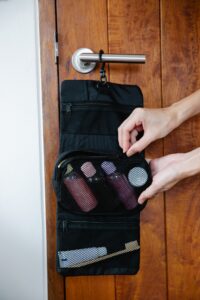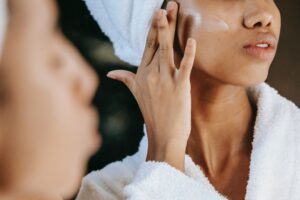Travel Tips: Skincare For Different Weathers

Traveling can be an exciting experience, but it can also wreak havoc on your skin. Different climates and environments can lead to dryness, breakouts, and other skin issues if you’re not prepared. That’s why it’s essential to adjust your skincare routine to accommodate the climate you’ll be traveling to. In this blog post, we’ll go over some essential travel skincare tips for different climates.
Hot and Humid Climates
Hot and humid climates can be especially challenging for your skin. The heat and humidity can cause your skin to produce excess oil, leading to breakouts and clogged pores. Here are some tips for caring for your skin in hot and humid climates:
- Use lightweight, oil-free moisturizers: Opt for lightweight moisturizers that won’t clog your pores. Look for products that contain ingredients like hyaluronic acid and glycerin, like the Tea Tree Balancing Moisturizer from 100% PURE, which can help hydrate your skin without making it feel greasy.
- Wear sunscreen: The sun’s UV rays can be especially harsh in hot and humid climates. Be sure to wear sunscreen with at least SPF 30 to protect your skin from sun damage. Look for water-resistant formulas that won’t sweat off.
- Use blotting papers: Keep your skin looking matte by using blotting papers throughout the day. They can help absorb excess oil and keep your skin looking fresh.
- Avoid heavy makeup: Heavy makeup can clog your pores and lead to breakouts. Stick to lightweight, oil-free makeup, and use blotting papers throughout the day to touch up.
Cold and Dry Climates
Cold and dry climates can be harsh on your skin, leading to dryness, flakiness, and even cracking. Here are some tips for caring for your skin in cold and dry climates:
- Use a rich, moisturizing cream: Switch to a richer, more nourishing moisturizer to combat dryness. Look for products that contain ingredients like ceramides. 100% PURE’s Seaberry Moisturizer can help strengthen your skin’s barrier and prevent moisture loss.
- Exfoliate gently: Use a gentle exfoliator once or twice a week to remove dead skin cells and keep your skin looking bright. Avoid harsh scrubs, which can damage your skin.
- Use a humidifier: A humidifier can help add moisture to the air and prevent your skin from drying out. Consider bringing a travel-sized humidifier with you on your trip.
- Wear protective clothing: Cover your skin with hats, scarves, and gloves to protect it from the cold and wind.
Tropical Climates
Tropical climates can be a paradise for your skin, but they can also be a breeding ground for bacteria and fungi. Here are some tips for caring for your skin in tropical climates:
- Use a gentle cleanser: Use a gentle cleanser, like the Lavender Oat Milk Soothing Cleanser from 100% PURE, to remove dirt, sweat, and bacteria from your skin without stripping it of its natural oils. Look for products that contain ingredients like tea tree oil or salicylic acid, which can help prevent breakouts.
- Keep your skin hydrated: Drink plenty of water and use a lightweight, oil-free moisturizer to keep your skin hydrated. Look for products that contain ingredients like aloe vera or cucumber, which can soothe and hydrate your skin.
- Use insect repellent: Insects can carry diseases, so it’s essential to use insect repellent to protect your skin. Look for products that contain DEET or picaridin, which are effective against mosquitoes and other biting insects.
- Avoid heavy fragrances: Heavy fragrances can attract insects, so it’s best to avoid them when you’re in a tropical climate.
High-Altitude Climates
High-altitude climates can be incredibly harsh on your skin, leading to dryness, redness, and sensitivity. Here are some tips for caring for your skin in high-altitude climates:
- Use a hydrating serum: High-altitude climates can cause your skin to become dehydrated quickly. Consider using a hydrating serum with ingredients like hyaluronic acid or vitamin C, such as the Rose Hyaluronic Acid Serum, to help boost your skin’s moisture levels.
- Wear sunscreen: The higher altitude can increase your skin’s exposure to UV rays, so it’s essential to wear sunscreen with at least SPF 30. Look for products that offer broad-spectrum protection to protect against both UVA and UVB rays.
- Use a lip balm with SPF: The cold, dry air in high-altitude climates can cause your lips to become dry and chapped. Protect them by using a lip balm with SPF.
- Avoid hot showers: Hot showers can further dry out your skin in high-altitude climates. Instead, opt for lukewarm water and use a gentle, hydrating body wash.
Pollution and Urban Environments
Pollution and urban environments can be tough on your skin, leading to premature aging, dullness, and congestion. Here are some tips for caring for your skin in polluted and urban environments:
- Use a gentle cleanser: Use a gentle cleanser to remove dirt, pollution, and makeup from your skin without stripping it of its natural oils. Look for products that contain ingredients like charcoal or clay, which can help absorb impurities.
- Wear a mask: Consider wearing a mask to protect your skin from pollution and other airborne irritants.
- Use antioxidants: Antioxidants like vitamin C and E can help protect your skin from pollution and other environmental stressors. Consider using a serum or moisturizer that contains antioxidants.
- Exfoliate regularly: Regular exfoliation can help remove dead skin cells and unclog pores, preventing congestion and breakouts.

In conclusion, adjusting your skincare routine to the climate you’ll be traveling to can make all the difference in keeping your skin healthy and glowing. From using lightweight moisturizers in hot and humid climates to wearing protective clothing in cold and dry climates, there are many ways to care for your skin on the go. By following these travel skincare tips, you can enjoy your travels without sacrificing your skin’s health.

